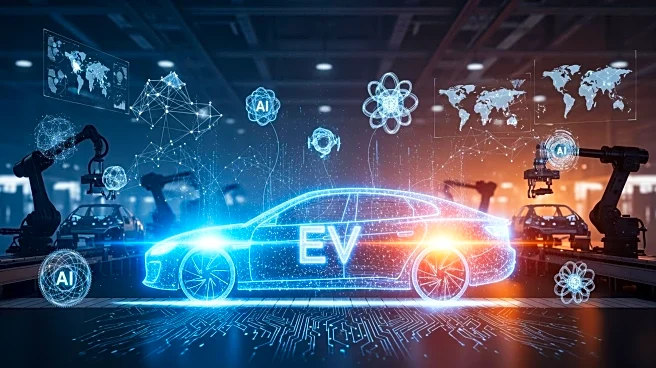What's Happening?
A comprehensive survey conducted by McKinsey reveals significant shifts in consumer preferences within China's automotive market, challenging traditional manufacturing strategies. The survey indicates
that innovation, rather than price cuts, is driving consumer demand. Shortened release cycles for new models and technologies have generated a net stimulus effect of 10.8 percent, significantly higher than the 0.6 percent effect from price competition. This trend suggests that flexible production systems capable of rapid model changeovers and technology integration will deliver better returns than those focused solely on cost reduction. Additionally, the survey highlights the growing appeal of plug-in hybrid and extended-range EVs, with owners using pure-electric mode for approximately 50 percent of their driving.
Why It's Important?
The findings from the McKinsey survey have profound implications for global automotive manufacturers. As consumer preferences shift towards innovation and technology integration, manufacturers must adapt their production strategies to remain competitive. The emphasis on rapid technology iteration and dual-powertrain flexibility suggests that traditional economies of scale or brand heritage may become less relevant. This shift could lead to increased investment in advanced battery technologies, autonomous driving systems, and smart cabin features, reshaping the global automotive landscape. Manufacturers that fail to align with these emerging trends risk underutilization and obsolescence.
What's Next?
Manufacturers are likely to focus on developing flexible production systems that can quickly adapt to changing consumer demands. This may involve investing in new technologies and capabilities to support rapid model changeovers and technology integration. As Chinese consumer preferences continue to influence global demand patterns, manufacturers worldwide may need to reevaluate their strategies to ensure they can meet the evolving needs of the market. The growing appeal of plug-in hybrid and extended-range EVs also suggests a potential shift in production capabilities, requiring manufacturers to manage complexity across battery, motor, and ICE systems.
Beyond the Headlines
The shift towards innovation and technology integration in China's automotive market highlights broader trends in consumer behavior and manufacturing strategies. As consumers prioritize advanced features and technology over traditional brand heritage, manufacturers may need to reconsider their approach to brand positioning and marketing. This could lead to a democratization of advanced features across price segments, challenging traditional notions of luxury and premium branding. Additionally, the emphasis on environmental credentials and infrastructure limitations may drive further innovation in charging technologies and infrastructure development.











